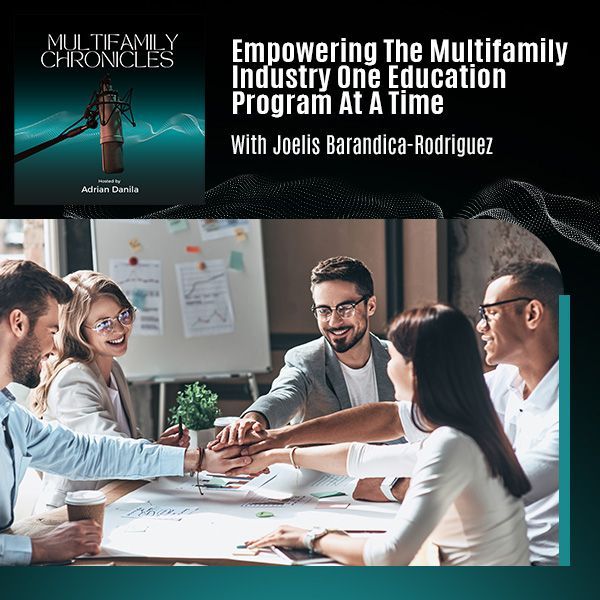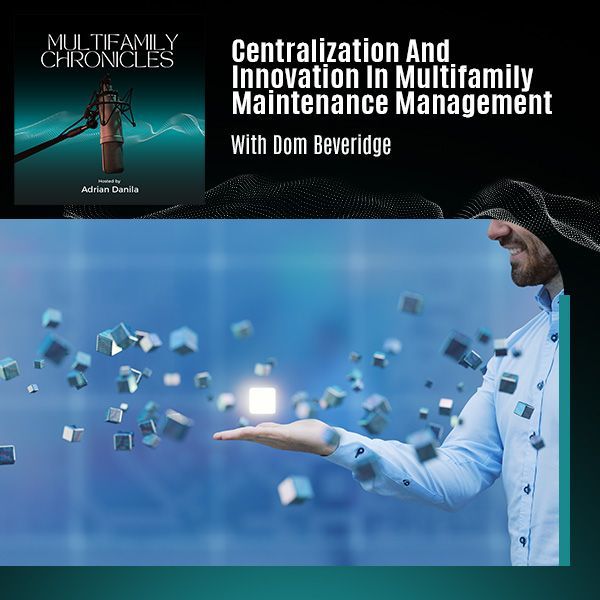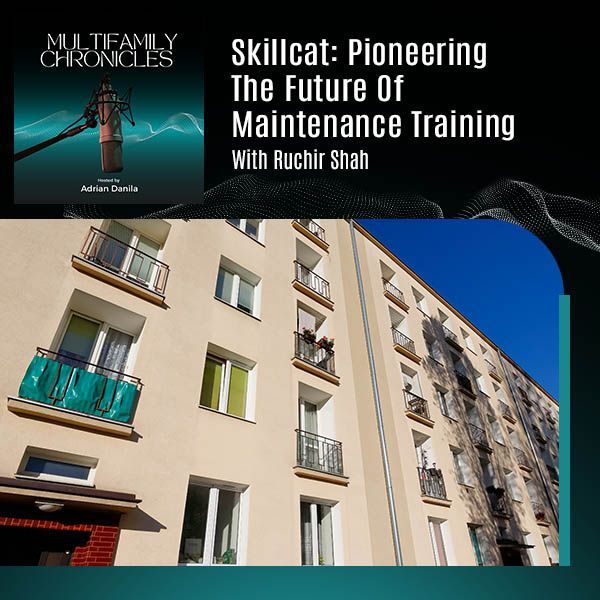How To Overcome Challenges And Become A Top Organization With Mike Brewer
How do you define success in your organization? Creating opportunities for those delivering impressive returns to investors, providing growth to employees, and improving the lives of residents is how Radco Companies define success. In this episode, Mike Brewer, the Chief Operating Officer at Radco Companies, shares his insights on helping an organization become a top organization and grow and succeed. Mike also talks about the beauty of being the multifamily space and doing the work of providing shelter for people. Tune in to this episode and don’t miss this opportunity to hear more of Mike’s insights on multifamily.
---
Watch the episode here
Listen to the podcast here
How To Overcome Challenges And Become A Top Organization With Mike Brewer
This is episode number thirteen. I hope this is our lucky episode. Number thirteen is a lucky number for me. My guest is a very special guest, someone that I’ve been following for a while, someone that invited me to his own podcast. It's a pleasure for me to introduce Mike Brewer. Mike is the Chief Operating Officer for RADCO Companies. Welcome to the show, Mike.
Adrian, thank you for having me. It's such a pleasure.
Mike, for the very few people that don't know who you are, why don't you start by introducing yourself to our audience and maybe give us a little bit about your background? You're a Chief Operating Officer. That's a very high position in an organization. Many people are looking at those positions and it's hard for them to picture, "How could I get from where I'm at now into an executive position or into a corporate-level position?" Maybe your story would help them be able to picture in their head or see and build a path and imagine how they could get there. I think that would be very helpful.
I'll try to practice in as abbreviated fashion as I can, but it's important to set some context. I was born into a difficult circumstance as a child. I grew up in a broken home that was full of mental health challenges from one of my parents' step-parents. I feel like that start in life was a little bit difficult, but it was also an incredible theme for me that taught me perseverance, grit, patience, and all those things that would be part of one's character in order to be successful in life.
That's not to suggest that I lived a perfect life up to this point in time. I certainly learned a lot of lessons the hard way. If I fast forward, I went to college at Texas Tech University on a basketball scholarship. I ended up dropping out of college about my third year in because some of those things from my childhood started to manifest themselves in the way of a depression in other areas of life. It became very challenging.
I dropped out of college and went to work at a single-family real estate company called RE/MAX Town and Country. RE/MAX is a national brand, but I started selling single-family homes right out of college or dropping out of college. I went into doing that. I met an incredible man who became a mentor of mine. It allowed me the opportunity to not only sell single-family homes but start to invest in them.
I got my teeth cut in the property management business by buying little houses. In my hometown, a house costs around $10,000. If you can imagine my first house, I didn't pay $10,000 for it. It was financed by the owner. Long story short, I learned about real estate from the foundation up. I was the guy fixing the broken toilet. I laid my own carpet. I had a knee stretcher. I had all the tools to do that. I worked on water heaters. I did everything on the service side of the business to manage my little portfolio of real estate.
I then decided to go back to college and ended up getting a leasing consultant job in what we would know as a traditional property management company. I quickly graduated from leasing consultant to assistant manager to property manager to district manager. Frankly, I didn't have a clue what I was doing along the way. I knew how to work hard. I was the first guy at the office in the morning. I was the last person to leave at night. I had an unquenchable thirst for knowledge, and I had a curiosity that never quit. I wanted to know how everything worked from the little sensor in the gutter that told the sprinkler system not to turn on when it was raining to everything that happened on the property.
That being said, I did that for a couple of years in Lubbock, Texas before moving to a nationally recognized brand called Equity Residential. I went to work there as a property manager, actually a general manager at the time. I decided that I wanted to aim for a higher level of responsibility. The way I decided to do that was I looked at this report. Equity published a thing called the ROR, and it came out every Monday morning. It told the entire company where every single property in the entire organization sat in terms of occupancy and rental income, etc. I would literally look down the list of properties and see where the most challenging asset was. I took it upon myself to figure out how I could position myself into those tough assets.
Pretty soon, you become known as the person who can fix problems. You start getting sent around to fix problems. That education in and of itself and fixing all those problems is what advanced me to where I am now. It wasn't because I went to work in the class-A high-rise luxury apartment community. They have their own problems, but it wasn't because I did that. It's because I went to the very challenging properties and figured out how to fix them, not by myself, but with great teams. That's how I ultimately advanced into the position I am in now. It’s hard work, grit, and a little bit of patience.
I want to pick up on something that you mentioned at the beginning, the challenges that you have to overcome in life. It's important for the audience to know your take. What resources helped you overcome the difficult situations in your life? What gave you this type of mindset of, “I’m going to have to be the person that is willing or is volunteering for doing the jobs that nobody else wants to do?” Those are very important points for our conversation.
I would go back to my childhood. When I grew up in this broken home, it was a fight for survival. It baked into my mind that the only way to get out of a difficult situation was to work, be it physical work or using your mind to work, being resourceful and being creative. It was almost a natural thing for me to look for difficult situations because I grew up in a difficult situation. It was a little bit of familiarity for me to go to a place that had difficulty. It was baked into me to work hard at it because that was the path to freedom or getting out of it. I chalk it up to shifting my mindset from what could otherwise have been a very easy thing to call myself a victim and potentially fall off into victimhood.
I wanted better for my life. I saw all around me the fruits of real estate, especially in the way of my mentor. My mentor was the catalyst for me. I saw all the fruits of his labors in the way of being able to live in a nice home, not an overly expensive house, but a nice home, driving a nice car and interacting with nice people. I thought, "I can do that. It's going to take a little more time for me probably, and I'm going to have to work hard at it, but I'd like to have some of those fruits of life." As a mindset shifts for me, probably the catalyst was the mentor that was in my life at the time. It still is to this day.
One other thing that I want to hop on was you mentioned Equity has a report that was presented weekly. They had everything you wanted to know about an asset and how the asset performs. This brings me to my next question. How important are KPIs in helping an organization become a top organization, grow and become very successful? What's the importance of having KPIs?
There are a handful of things that are very important to a successful outcome. KPIs are a piece of that. Somebody taught me a long time ago, you have to measure what you want. If you don't measure it, you're not going to get it. That's where a KPI comes into play in my head. There are downsides to KPIs and especially in the last 3 to 5 years, plus or minus win, where big data has entered the equation. We're able to harvest data from sensors and all kinds of other inputs. We can get all kinds of data and we can put it in a big data farm or data lake, and we extrapolate it out. We can get nuanced to no end. That's dangerous because, in my mind, there are 8 to 10 key drivers of real estate.
There are 8 to 10 key measures that you need to pay attention to. Maybe there are a few subsets to each one of those parent KPIs, but if you get beyond that and you're trying to measure what water flow is on a Tuesday at 4:00 in the afternoon when people come home from work. I don't know the value of that. At some point, you've overdone it and it gets you to the downside. The incremental change you're going to see out of that is not important. It's not important enough, at least in my head. Pay attention to the fundamentals of our business, and you'll be quite successful.
Mike, behind you is an impressive library. I’m seeing that library every time I’m watching one of your videos. You do most of your videos from the library. I’d like for you to share with the audience a couple of books that influenced you in a big way. They are maybe a few books that influenced you from a professional perspective, and a few books that influenced you in life in general or your way of thinking that was a game-changer for you.
There are definitely a few I would share. I always start with the Bible. It is the most important and amazing piece of literature on the planet. It's something that I spend time on every single morning. It's the best SOP for life. I believe that a lot of literature, including a lot of business literature, is born out of the Bible. Some of the books that have influenced that are germane to that, one is a book called The Choice by Og Mandino. It’s a very short book, about 100 pages.
Very quick story. I was doing an open house for one of my very first single-family home sales for RE/MAX. I walked into the house and it was an occupied home. Laying on the kitchen counter was a book called The Choice by Og Mandino. My open house didn't yield one person. Not one person walked into my open house that day, but I read the entire book because I didn't have anything else to do. It impacted me such that at the end of the book, I was literally crying. I had real tears in my eyes at what the book was communicating. I read every single Og Mandino book that I could get my hands on from that point, which gave way to things like Think and Grow Rich by Napoleon Hill and As A Man Thinketh by James Allen.
I got deep into spiritual literature, business literature, philosophy and stoic philosophy, and things of that nature as they evolved over time. For the price of a couple of cups of coffee, you can get more wisdom in an afternoon than you can by watching mindless television. I advocate books all day long. There's so much you can get out of them.
It's also an opportunity to gain a lifetime's worth of experience within a few hours. Some of the books are distilling someone's lifetime experience. If you read a book, you could possibly live through that book someone's life experience. I don't know how many things are more powerful than that.
It's an abbreviated version of what somebody took 40 or 50 years to learn. You can save yourself the time and the mistakes that you might otherwise make in the course of two hours. It's important to save for whatever this is worth. Many people have said this to me and I believe it. It's been hard for me, but sometimes you have to put the books down. You have to go to work because you can get caught up in procrastinating. You can learn a lot. You can put a lot in here, but it doesn't mean anything until you start putting it into practice.

Get to the execution part. We talked a little bit about your background and how you became as successful as you are now. In our society, success is typically packaged and sold to us as something very shiny. Everybody talks about what you acquire, whether there's a position, an organization, whether it's wealth or property, but then very few people go through the dark side. They don't see how you got here. There's so much failure and so much pain through the whole journey that not so many people are talking about. I’d like to ask you, how did an apparent failure that you had turn up into a successful you? Can you think of a story that you want to share?
There's one that always comes to mind for me. I'll lead by saying that if you're able to get yourself in the mindset of understanding that out of every failure comes success or a lesson that leads to success, on the downside of any adversity are the seeds of greatness. When I worked at Equity, I have the position of general manager. Five times I applied for the position of area manager, which was a step above me. Five times I applied for that position and four of those times, I was told no. Four of those times I wasn't in my head given solid reasons for why I wasn't ready for that position, or at least the story I told myself was the reasons these people were telling me that were not good ones. That's the story I’m telling myself.
On the downside of any adversity are the seeds of greatness.
I remember I went through these little moments of self-doubt and disappointment certainly and depression reared up. I remember every single time I would go back to the Og Mandino books or I'd go back to Think and Grow Rich books or some of these deep spiritual books and I’d read. I would always take away from that every no gets you that much closer to a yes. At some point, somebody is going to say yes. I never stopped trying, even though I did experience those moments of grief and disappointment and frankly, depression at times. It was a never give up attitude that was able to get me through those things and take away the lessons each time I did hear a no.
If you were to offer advice to young people coming out of school, whether it's high school or college, I typically do a post every now and then on social media or on LinkedIn saying, “Things I wish I knew when I was twenty.” I'm thinking about how valuable they were. I list whatever comes through my head at the time. If you were to give some pieces of advice to the young ones, they're coming into the workforce, they're starting to live on their own experience, real life with getting a job, interacting with people, making a living, what would be a few pieces of advice that you would offer them?
I’ll start by saying that I don't necessarily qualify myself as a person that can give great advice, but I’ll make a fair attempt at this. If you can get yourself in the mindset of being a practitioner in understanding the skillsets that are necessary in the world to get yourself to advance. By skillsets, I don't mean how do I do a spreadsheet or how do I fix a toilet or how to fix a water heater or how do I do any hands-on type of activity, although those things are all important.
The thing that I would encourage you most to do is go out and figure out how to build your character. Live with honesty, integrity, and resourcefulness. Sharpen your creativity and all those things that make you a better person so that when you show up and you're present with others, you can get things accomplished because you're a good person.
Somebody told me one time that as long as you keep your side of the street clean and you do the right things, everything else will take care of itself. The second you let your side of the street get a little bit dirty or harmed, meaning your character gets a little marred or your word doesn't become solid, you start to get off track. Coming out of school, make sure that you're protecting your word, your character and your name because that is the thing that will endure over a longer bit of time.
If you were to think of a new belief or a new habit that you have developed or a type of behavior that you developed for the past 3 to 5 years that fundamentally changed your life, what would that be?
There are two things that come to mind. One is sleep. I don't mean that as a joke. If you can condition yourself to get 7 or 8 hours of sleep every single night, try to go to bed at the exact same time and wake up early. I truly believe that 4:30 to 5:00 in the morning is the time to get your day started. I say that because of this, which is the second thing. That is starting your day off with a win. Every day when I get out of bed, I make the bed because that is a win. I consider that a win for the day and we're off to a good start.
I exercise every morning. I meditate and spend time with God in prayer and reading the Bible. I do try to eat very well in terms of nutrition. That's more than two, but those are the first few things that I do when I get out of bed every morning that are habits that will change anyone's life. They change my life and they can change anyone's life.
Some of the things we encounter in our life are situations where we can't focus. We're feeling overwhelmed, and then it's very hard to get out of that situation or out of that mindset. Could you think of something that helped you get out of that mindset of not being able to focus and being overwhelmed by a situation? What are the things that helped you in getting out of that mindset and get back on track?
This is worthwhile to the audience. I'm about to get too deeply personal, but I was diagnosed with Asperger's. It's been a lifelong thing, but I finally gave in to the fact and took the diagnosis. That means I'm high-spectrum autism. One of the things that are associated with high-spectrum autism is anger. When I get overloaded emotionally, it tends to come out in the way of anger. I learned a very long time ago how to manage anger. I don't think anger ever goes away. There are some forms of anger that are healthy in the way of protection and survival or are helping in those two areas of life. That being said, when I get emotionally overloaded, I’ve been taught to take a step back. This works for me.
It doesn't matter what circumstances are prompting you or triggering you. You have to physically take a step back from whatever room you might be in or whatever place you might be. Literally, take five deep breaths in. When you take a breath in, you hold that breath for about four seconds. It's a 4-count in, a 4-count hold, and a 5-count out. I do that five times.
Take a step back. It doesn't matter what circumstances are prompting you or triggering you. You have to physically take a step back from whatever room you might be in or whatever place you might be and take five deep breaths in.
When I do that, it helps get this cortisol level in my mind that's going off. It gets that chemical back in balance so that I can re-enter a conversation that might be triggering to me or overloading to me. That works for anything that might cause you to go off the rails. It sounds juvenile, but give yourself a timeout. Go over stand in the corner and do some breathing, and then you can come back to a situation.
The biggest challenge is how to find that self-control to tell yourself, “I need to take a deep breath.” We've all been in situations where we've been mad or angry, and someone else will say, "You need to calm down." How many times did you see a person calming down when someone tells them to calm down? It never happens. It's the opposite. It's like fueling a fire or putting gas on a fire. It’s very true. Hopefully, everybody is going to find that resource to say, “I’m going to have to take a step back and take some deep breaths, and then get back to a calm state.”
It's perfectly acceptable to give yourself permission to do that. It's a much healthier way of living life for sure.
I would like to touch on a few multifamily industry-related topics. Great Resignation is something that everybody is talking about nowadays. It's a phenomenon that is being accelerated by COVID, but we've been going on this path for years. What COVID did was to accelerate the process, and then here we are now.
I wanted to say that I see this as a challenge for all organizations because it's very hard to keep even a core group of people running the business, not to say fully staffed. To say, “We're fully staffed,” nobody even posts anymore for that. I wanted to ask you to touch on what you think led to this phenomenon or situation that we're in. How do we take this as an opportunity, and what are a few ways that you think we could overcome as an industry in general?
This is a topic that is near and dear to my heart because we talked about it when you were on the other podcast. If I were to narrow this down to what was the catalyst or the cause for where we are now, I would have to go back 10 or 15 years ago with the advent of the internet and then, ultimately, social media. It's not to blame social media necessarily because the advent of the internet and social media is an extension of human nature. What it has done is completely rewired the brains of a complete generation. In that, you're consumed with everyone's highlight reel. You're scrolling and constantly looking at these presentations that are probably more times are not real.

Your mind gets presented with this reality. You start telling yourself a story that you can live a life like that. You see these things and you scroll nonstop. You decide in your own mind that you don't need to work that hard because look at all these people over here who are making big bucks on YouTube or Instagram because they're influencers. You get wound up in all of that. We all become subject to it. I’ve been guilty of picking up my phone and I scroll. The next thing I know, an hour is gone. That started the whole momentum of I don't need to work that hard anymore and manifests itself in the way of this entitlement.
I'm not going to blame the entire generation for feeling entitled, but there is a big percentage of people out there that feel entitled. They don't have to put in the reps. “If you hire me today as the asset manager, I should be the vice president in a week.” It’s that mentality. When COVID came along, it accelerated the pace of all of that in part because you had these huge injections of capital that were put into the world by governments. That's not a rail against the government. You have to support people when it's necessary, but some of that lived on too long and people became to it. I also think that people were jarred out of this dead-end routine that they had become used to.
The Great Resignation is not necessarily a bad thing. It has given a lot of people the opportunity to wake up, take a look at where they are now, and decide whether or not they want to continue to do that. It's a good thing for them. I also think it's a good thing for organizations because if you have somebody that is discontent and not excited and doesn't want to be there, then they shouldn't be there. You don't want them there. To the extent that people want to be part of something, this is where culture becomes important.

If you've created a culture and an ecosystem that enriches people, supports people, celebrates them and picks them up when they've been beaten up by life, then you're not going to be a subject to or a part of the Great Resignation as much as other people are. Even if they wake up and they decide, “I don't want to do this anymore,” they're going to give you everything they have until they move on to do something else. I don't know. I have a love-hate relationship with this idea of the Great Resignation.
It's also a great opportunity for us as employees. To look at what's around us and how much we could gain from the situation, in a way, possibilities are pretty much endless. For us as employers, it’s to say, “What are we going to do going forward to maybe retain people?” First, everybody is now focusing on how we get talent. You still have some talent left. It's not like you're by yourself.
Let's start by focusing on the existing talent, and see what we can do for existing talent. We're seeing sign-on bonuses. I’m not against that by any means. I’m all for all of the above. Any type of incentives that you could provide to get great talent, I’m all for it. At the same time, if you're offering so much more people from outside of the organization to come join you, and you are not spending the same significant effort to keep your existing talent, this might have a boomerang effect. While you are chasing talent, then your existing talent is rushing towards the back door. It becomes a never-ending cycle.
This is one of the things that don't maybe show in surveys. I’ve done a few surveys on LinkedIn and the number one choice for people to switch jobs nowadays is pay. This comes up at the highest percentage in the post that I’m doing. There's definitely a very big incentive for people to change jobs for pay, but then something that doesn't show as much as it matters to people is doing meaningful work. Would you like to weigh in on that, Mike? I’d like to hear your opinion on it.
Both things you said there are true. Wage inflation is something that could have happened a long time ago, not only for your internal employees. Certainly, it’s first and foremost, but as we compete out in the marketplace, it's been too long waiting. I’m very happy for people as long as the business can sustain that type of pay to our team members. There are a lot of team members out there that absolutely deserve that and probably have been waiting for that for a long time.
Doing meaningful work, even though pay probably yields as the top choice in your survey results, if people were searched down deep, doing meaningful work is more important than pay. Pay is important, but being a part of something bigger than self, and being part of the vision or a mission or a company that has a value system that aligns with your value system makes it more exciting to get out of bed in the morning, and go and spend time with those people.
Those people are of like mind. They care and they want to do good work in the community, not solo. What better place than the multifamily space to do meaningful work? I’m not the first person to say this, but we provide homes for people. One of the fundamental building blocks of being in the world is shelter. It's in the hierarchy of needs. Shelter is up there with water. It's so important. What better place to be than to be in the multifamily space doing meaningful work? You can wake up every day knowing you're going to do some meaningful work because you were providing a home for someone.
Unfortunately, our episode is about to approach the end. It's been a fantastic conversation. I truly enjoy our conversation here. In closing, I’d like to give you the opportunity to say something for the audience that you’re very passionate about, something you wish we touched on and we don't have the chance to during the episode.
I’ll try to make this brief, but the thing I would leave everyone with is mental health in this country and in the world right now is front and center to me. The pandemic highlighted this. It didn't cause it, but it didn't help it. It was something that has existed for a long bit of time. The acknowledgment that team members are coming to work every single day with the weight of the world on their shoulders. It manifests itself in the way of mental health behaviors.
Anybody that is in a position of influence in an organization needs to be an advocate for mental health by providing psychologically safe spaces inside of your organization, and certain resources. We're not doctors, psychologists or psychiatrists, but we certainly are people that can love each other and help each other find resources to deal with. We have a heavy world right now. It doesn't mean there aren't great things happening in the world, but there are certainly a lot of heavy things in the world right now. It is in any and every organization out there in the multifamily space to make a place for people who are dealing with difficult challenges. Do your part.
Thank you very much for taking the time to come. I hope we can do another one very soon.
Thank you very much for having me. I appreciate It.
Thank you, everybody. I hope to see you back soon for another episode.





